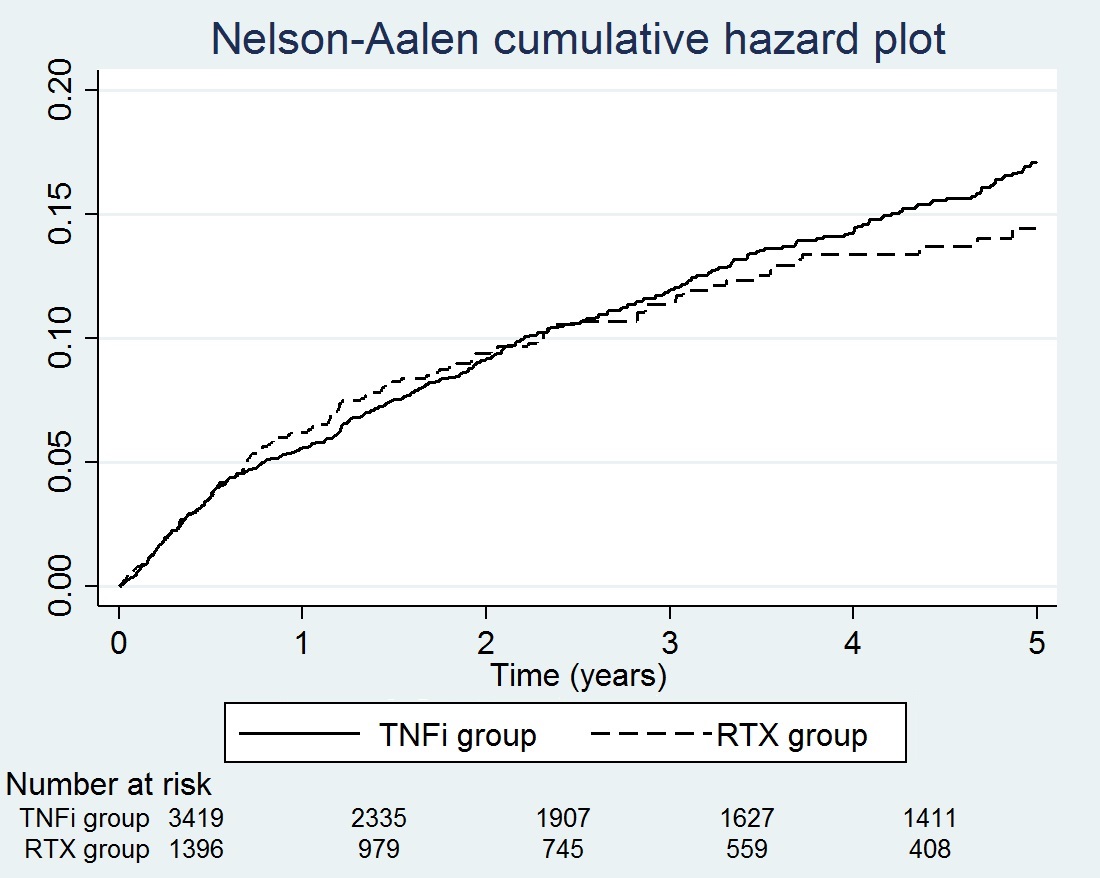Session Information
Date: Sunday, November 5, 2017
Session Type: ACR Poster Session A
Session Time: 9:00AM-11:00AM
Background/Purpose: In the United Kingdom (UK), rituximab (RTX) or a second tumour necrosis factor inhibitor (TNFi) are both permitted treatment options for patients with rheumatoid arthritis (RA) who have failed a first TNFi. The risk of serious infection (SI) is similar between these 2 treatments during the first year. However, long-term data on risk of SI for RTX are scarce but required, in light of reports of reduction in IgG following repeated dosing. We compared the risk of SI over 5 years of treatment in patients with RA who had failed a first TNFI and then received either RTX or TNFi .
Methods: This study used patients with RA registered with the British Society for Rheumatology Biologics Register (BSRBR-RA) a large national prospective study established primarily to assess the long-term safety of exposure to biologic therapies in patients with RA. This analysis included patients treated with either a second TNFi or RTX after failing a first TNFi. Patients were followed until first SI, 90 days (TNFi) or 9 months (RTX) following last dose when treatment was discontinued, last recorded follow-up or the end of the 5th year after the switch, which ever came first. SI was defined as infection requiring intravenous antibiotics, hospitalisation or resulting in death. The risk of first SI was compared between TNFi and RTX using (i) unadjusted, (ii) adjusted for sex and age, and (iii) propensity score adjusted Cox proportional hazard models. A Nelson-Aalen (NA) plot was constructed to show the cumulative incidence of SI over 5 years.
Results: This analysis included 3419 TNFi-treated patients contributing 9527 person-years (pyrs), median (IQR) exposure time per person 2.0 (0.8-3.3) years; and 1396 RTX patients contributing 3570 pyrs , median (IQR) exposure time 2.9 (1.7-3.9) years. A total of 362 and 135 first SI were reported in TNFi and RTX patients respectively, giving a crude incidence rate (95% CI) of 38 (34-42) SI/1000 pyrs (TNFi) and 38 (32-45) SI/1000 pyrs (RTX). The unadjusted, adjusted for sex and age, and propensity score adjusted hazard ratios (95%CI) for SI were 0.9 (0.8-1.1), 0.9 (0.7-1.0) and 0.9 (0.7-1.1) respectively. The NA plot showed a similar cumulative incidence risk of SI between the two groups over 5 years of treatment (figure).
Conclusion: The risk of serious infections was comparable over 5 years of treatment between TNFi and RTX treatment in patients who had failed a single prior TNFi.
To cite this abstract in AMA style:
De Cock D, Kearsley-Fleet L, Silva Fernández L, Lunt M, Watson K, Symmons DPM, Hyrich KL. Long-Term Risk of Serious Infections in Patients with Rheumatoid Arthritis Treated with Rituximab: 5 Year Data from the British Society for Rheumatology Biologics Register for Rheumatoid Arthritis [abstract]. Arthritis Rheumatol. 2017; 69 (suppl 10). https://acrabstracts.org/abstract/long-term-risk-of-serious-infections-in-patients-with-rheumatoid-arthritis-treated-with-rituximab-5-year-data-from-the-british-society-for-rheumatology-biologics-register-for-rheumatoid-arthritis/. Accessed .« Back to 2017 ACR/ARHP Annual Meeting
ACR Meeting Abstracts - https://acrabstracts.org/abstract/long-term-risk-of-serious-infections-in-patients-with-rheumatoid-arthritis-treated-with-rituximab-5-year-data-from-the-british-society-for-rheumatology-biologics-register-for-rheumatoid-arthritis/

